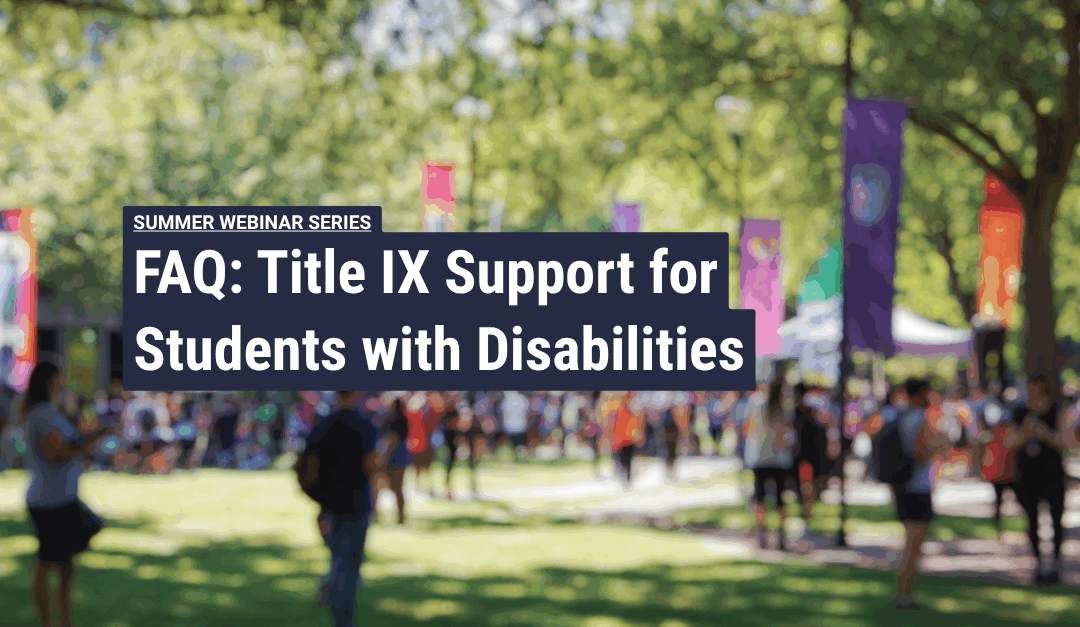Your Top Questions Answered
What happens when a student with a disability enters a Title IX process, whether as a complainant, a respondent, or a witness?
In a recent Title IX Solutions webinar, “Supporting Students with Disabilities in a Title IX Process,” education law experts Nancy Potter and Mark Weiker explored this critical and often overlooked topic. Drawing from real-life case examples and legal expertise, they tackled the operational, legal, and ethical complexities involved in these matters and shared practical tools to improve practices.
If you missed the webinar, it’s now available on demand. But in the meantime, here’s a look at some of the most important questions we explored and what every Title IX or student conduct professional should know.
1. Why does Title IX compliance need to account for disability accommodations?
Procedural fairness means little if a student with a disability can’t fully access the process. As Nancy Potter emphasized, accommodations aren’t a bonus. They are a legal requirement under Section 504 and the ADA.
2. What are schools actually required to do under Section 504 or the ADA?
They must ensure meaningful access which includes evaluating and providing reasonable accommodations for students with disabilities in all institutional programs, including the Title IX process.
3. What if a student has not registered with disability services?
In higher education institutions, the onus is on the student to disclose and request accommodations, but as Nancy and Mark explained, institutions can take proactive steps to flag when a student is registered and open the door to an interactive process.
4. Can you share examples where lack of access caused harm?
Yes! The webinar explored powerful real-world examples:
Talia, a complainant with PTSD who was retraumatized during a poorly managed hearing; Dante, a respondent with ADHD whose communication struggles were misinterpreted as dishonesty; and Jordan, a student on the autism spectrum whose behavior was seen as harassment when it was actually disability-related.
5. What kinds of accommodations should we consider during Title IX proceedings?
Breaks. Support persons. Pre-written questions. Slower pacing. Simplified language. Access to visual supports. These are merely some examples of numerous accommodations that might be considered. The options are not one-size-fits-all, but they’re all part of what the law calls a reasonable accommodation.
6. Can our Title IX office talk to disability services? What about FERPA?
Yes. FERPA allows for appropriate sharing of information between institutional officials with a legitimate educational interest which includes coordinating accommodations.
7. Are there legal cases or federal guidance we should be aware of?
Yes. Mark and Nancy cited the Denver case (2021), which affirms that procedural fairness is required in Title IX, and Wayne v. Tufts (1991), which reinforces the right to individualized accommodation under Section 504.
8. What can we learn from K–12 practices?
In K–12 settings, schools are required to identify students with disabilities and consider their needs throughout disciplinary processes. While that legal standard does not carry over to higher education, the mindset should.
9. How can we build better coordination between Title IX and disability services?
The presenters shared actionable ideas: regular cross-office training, policy templates that outline coordination, shared student software systems, and co-located offices when possible.
10. How can we learn more or bring this training to our campus?
The IX Institute offers training—including sessions tailored for Title IX professionals, student affairs staff, legal counsel, or disability support teams.
Watch the full webinar on demand to explore each case example in depth and get practical guidance from two of the top legal minds in the field.
Have more questions? Title IX Solutions is here to help. Contact us today to schedule a compliance review, training session, or policy consultation and ensure your institution is fully prepared.
Please Note: The information provided in this article is for educational purposes only and not intended to be legal advice. We recommend seeking independent legal advice concerning the issues presented in evaluating a particular incident.
Looking for In-Depth Training? Check Out Our Title IX Coordinator Certificate Course:
Unlock expertise in handling Title IX complaints, investigations, hearings, and appeals with full compliance.



